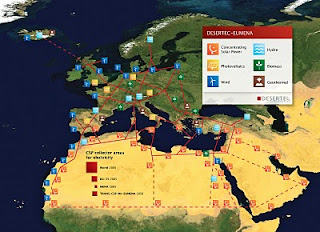
Japan, the only country to have experienced not one but two atomic weapon blasts which devastated two major cities, has now suffered what is probably going to become the third worst civil nuclear disaster in the world.
Many voices are lining up to say that this is the nail in the coffin for nuclear power. There have been anti-nuclear demonstrations in Germany and Greenpeace is calling for the phasing out of all existing power stations. They say nuclear power is simply too dangerous.
Those on the pro-nuclear side have in the last few days been consistently underestimating the way that events have actually unfolded. My inbox has been filled with nuclear pundits offering their prognoses which have been proved invariably wrong.
Nevertheless even some environmentalists such as
Mark Lynas are arguing that we still need nuclear power and that it's worth the risk because the alternative - runaway climate change - is unavoidable without it.
Nuclear or renewable future?
Japan imports 90% of its oil and has used nuclear power to help fuel its economic success with a measure of energy independence. Up to now, the Japanese public have largely trusted the authorities.
The terrible consequences of the tsunami, the attendant economic collapse, the lack of services, electricity and food, and the terrifying prospect of an invisible enemy in the air or in the food around them has shattered this trust.
Hideki Ban, a Japanese antinuclear movement activist and leader of the Citizen's Nuclear Information Center (CNIC), commenting on the disaster, said at the weekend in an
interview with an Italian newspaper "By an accident of this magnitude it is very likely (and is also our hope) that the close dependence of Japan on atomic energy will come to an end."
Yet would Japan be able to power all of its needs with renewable energy? And if it can, how long will it take to build the generation capacity? It would not do so with solar photovoltaic and wind power alone. However, it is an island and there is no shortage of marine energy or geothermal energy, whose effect could be magnified by the use of combined heat and power and heat pumps, or of food and crop waste for anaerobic digestion.
All new buildings to replace those lost could be constructed to become zero energy using the
Passivhaus standard. If Japan can achieve energy security using renewables, then certainly so can the rest of the world.
And if it can't, then presumably the rest of the world cannot successfully tackle climate change either.
Mark Lynas argues that if we abandon nuclear power then in the immediate term coal will take up the slack. Without any proven (at scale) carbon capture and storage, this could well accelerate global warming.
The renewable vision
But it doesn't have to be like this. Large-scale deployment of anaerobic digestion, solar thermal power plants, marine energy and wind power linked by high-voltage supergrids can power economic revival.

The map right shows where
it has been calculated that six large solar thermal plants situated in the hottest spots on the planet could power the whole world with such supergrids.

The European
Desertec project is one such example of a project that could revolutionise North Africa and Europe and the Middle East.
The far east could have just such a super grid.
Is it feasible? Is it affordable?
What really brought nuclear power to a halt after the Three Mile Island disaster in America was the refusal of insurance companies to foot the bill for new construction given the potential damage to them were there to be another accident.
The same reaction is extremely likely again, in many countries of the world.
All renewable energy technologies carry far less inherent risk but more up front costs. If they are more expensive in capital terms, they are less expensive in terms of their running costs, security requirements and insurance requirements.
What the fulfillment of this dream requires is the political will and about the same amount of capital as it will take to build nuclear power stations and maintain their security and insure them against disaster in the future.
The health risk
Nuclear power is inherently dangerous. The whole supply chain including mining in countries like Niger promotes environmental desolation and conflict.
Mark Lynas argues that there have only been 50 deaths as a result of the Chernobyl disaster and this is an acceptable price.
But that is not the whole picture. There has been a great increase in thyroid cancers as a result of the ingestion of caesium-137, which can remain in the environment and food chain for 30 years.

Several of my friends around where I live have for many years received visitors from the Chernobyl area - children badly affected by radiation with terrible deformities. They come for holidays. It is awful to see them.
According to the
World Health Organisation, an expert group from the US National Academy of Sciences has concluded that "there may be up to 4,000 additional cancer deaths among the three highest exposed groups over their lifetime". These groups contain 630,000 people.
Those who argue that all of this is an acceptable price to pay to tackle climate change have not seen the suffering themselves close to hand. If it was happening to them or their family, friends and neighbours they would not be so gung ho about it.
It's time to say no to the nuclear lobby. We don't trust you any more.



